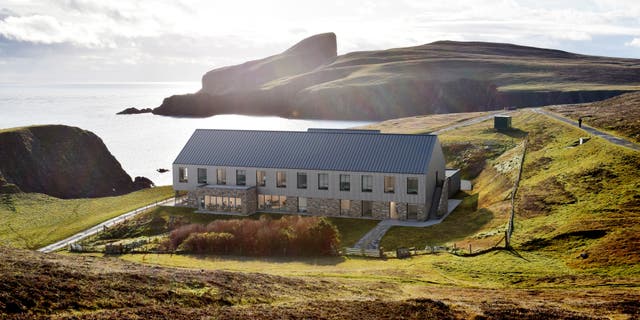
A Scottish island, and one of the UK's most remote inhabited communities, has now become what could arguably be called the safest place in the UK - since every adult has now been vaccinated against Covid-19.
All 35 adults have received the jag on Fair Isle, which is home to around 60 people and lies between Orkney and Shetland.
The community is famous for its production of Fair Isle knitwear, as well as migratory birds.
NHS Shetland said all adults on the island were given their second dose on Monday after a small plane flew in vials of the Oxford/AstraZeneca vaccine encased in a cool box.
There have been no reported cases on the island, which is three miles long and around 1.5 miles wide.
Edna Mary Watson, NHS Shetland’s chief community nurse, said travelling to some remote islands by air could be challenging with unpredictable weather.
But she added: “This is all part of the challenge of providing health and care in remote and rural communities and we are very grateful and proud of our team of community nurses who understand the challenges and have a flexible and can-do mindset.”
More than two-thirds of the adult population of Shetland have received their first dose of vaccine, and more than a quarter (27%) have had both, said Dr Susan Laidlaw, NHS Shetland public health consultant.
READ MORE: Scottish Islands set to reopen to tourism - but locals face longer Level Three rules
“Once we have received further supply of vaccine that we can use for first doses, we will be calling the remaining age groups which covers those aged 18-44 who have not yet been vaccinated – approximately 6,000 people,” she said.
Shetland had an estimated population of 22,920 in mid-2019, according to the National Records of Scotland.
Fetlar, one of the north isles of Shetland, saw vaccinations completed last Wednesday when 48 people were inoculated, NHS Shetland also said.
Some 14 vaccinations are due to take place on the island of Foula next Monday.
Fair Isle is an important breeding ground for seabirds and stopover for migrating species and is well-known for a distinctive style of knitted garments.
 An artist’s view of the proposed new bird observatory on Fair Isle (PA)
An artist’s view of the proposed new bird observatory on Fair Isle (PA)
Its renowned bird observatory burned down in 2019 and islanders are currently fundraising for a new site.
Meanwhile in Orkney, adults on the nine most remote islands have been vaccinated in the same priority group order used on the Orkney mainland.
Orkney’s biggest remote island is Westray with a population of 600 people and the smallest is North Ronaldsay with 42 people.
Maureen Firth, NHS Orkney head of primary care services, said: “Across Orkney we have vaccinated down to age 34 and we are now busy with second vaccinations.
“On Monday this week we had administered a total of 16,891 vaccinations – some of these include second doses. This is about two-thirds of Orkney’s adult population.”
Travel to and from Scotland's island communities

Currently, Orkney, Shetland, and the Western Isles are under Level Three, along with Coll, Colonsay, Erraid, Gometra, Iona, Islay, Jura, Mull, Oronsay, Tiree, and Ulva (in Argyll and Bute council area) and all of the islands in the Highlands, with the exception of Skye, which is at Level Four.
Yesterday, Nicola Sturgeon announced that travel to and from Scotland's island communities and the mainland will be permitted from April 26.
However, the islands will remain under Level Three Covid restrictions until mid-May.
This decision means they can open up to tourism - which would not have been possible in a lower level than the mainland.




Why are you making commenting on The Herald only available to subscribers?
It should have been a safe space for informed debate, somewhere for readers to discuss issues around the biggest stories of the day, but all too often the below the line comments on most websites have become bogged down by off-topic discussions and abuse.
heraldscotland.com is tackling this problem by allowing only subscribers to comment.
We are doing this to improve the experience for our loyal readers and we believe it will reduce the ability of trolls and troublemakers, who occasionally find their way onto our site, to abuse our journalists and readers. We also hope it will help the comments section fulfil its promise as a part of Scotland's conversation with itself.
We are lucky at The Herald. We are read by an informed, educated readership who can add their knowledge and insights to our stories.
That is invaluable.
We are making the subscriber-only change to support our valued readers, who tell us they don't want the site cluttered up with irrelevant comments, untruths and abuse.
In the past, the journalist’s job was to collect and distribute information to the audience. Technology means that readers can shape a discussion. We look forward to hearing from you on heraldscotland.com
Comments & Moderation
Readers’ comments: You are personally liable for the content of any comments you upload to this website, so please act responsibly. We do not pre-moderate or monitor readers’ comments appearing on our websites, but we do post-moderate in response to complaints we receive or otherwise when a potential problem comes to our attention. You can make a complaint by using the ‘report this post’ link . We may then apply our discretion under the user terms to amend or delete comments.
Post moderation is undertaken full-time 9am-6pm on weekdays, and on a part-time basis outwith those hours.
Read the rules hereLast Updated:
Report this comment Cancel